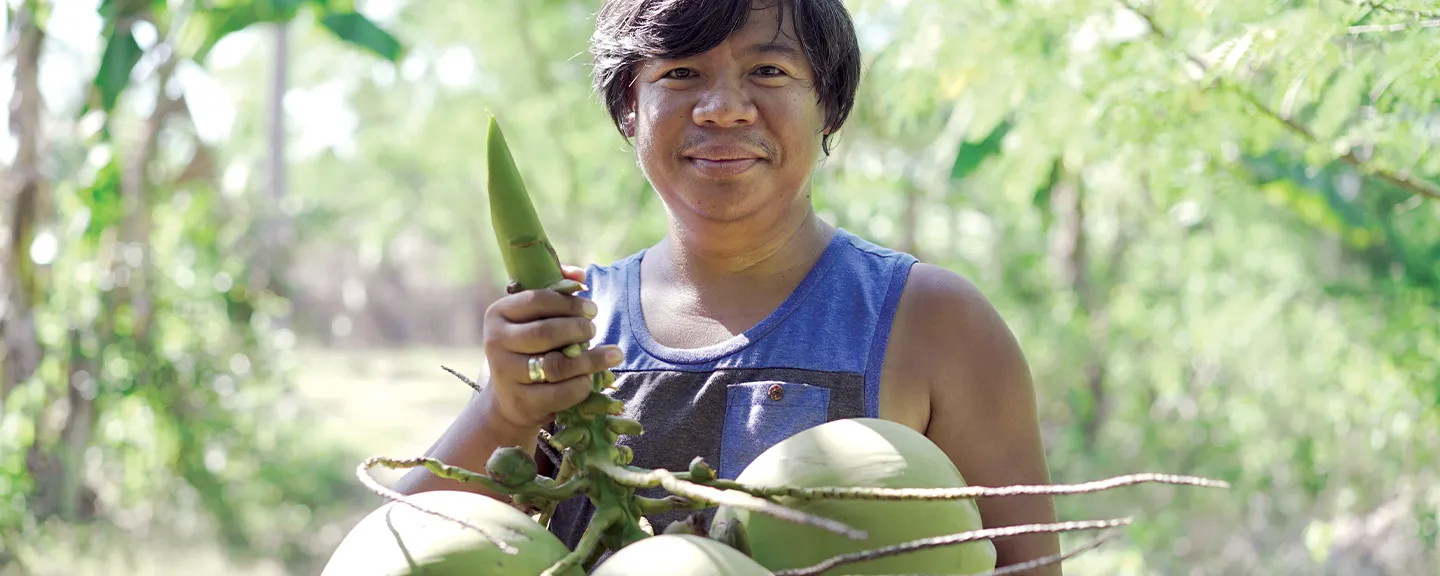- Home
- >
- APU Articles
- >
- News Article
Dignity Coconuts: Creating a Thriving Community
September 27, 2021 | Written By Abigail Reed

“Those in poverty often describe their situation as more than just a lack of physical resources; to them, poverty is feeling trapped, hopeless and ashamed,” said Erik. “Dignity Coconuts aims to break this cycle, restoring hope and dignity.”
Erik and Bet’s work with Dignity Coconuts can be traced back to their time at Azusa Pacific University, where they met. As they attended classes, worshipped in chapel, and engaged with the community, God grew their hearts for those in need.
“My time at APU deepened my desire to not only spread the Good News, but to also bring transformative change in physical lives and communities around the world,” said Bet, a Christian ministries major.
Following graduation, the Olsons returned to APU as an engaged couple to lead an undergraduate Action Team, traveling to Athens to work with victims of human trafficking. On those streets at midnight, handing out hot coffee and befriending endangered women, God stretched their hearts in a new way.
“Many of these women came from abject poverty, received false promises, and were utterly trapped,” said Erik. “The root issue could often be traced back to lack of jobs and opportunities.”
When Bet’s father, also burdened by the worldwide problem of human trafficking, set out to create a business that would provide safe and fair jobs to women in poverty, Erik and Bet jumped at the chance to get involved. At the time, Bicol was accessible by motorbikes only, the nearest hospital was three hours away, and rain made travel often impossible. What kind of large business could possibly thrive in such conditions? Coconuts. More than 86,000 coconut trees span the surrounding area, most owned by small farmers living in poverty and burdened by mounting debt. Dignity Coconuts stepped in, providing fair partnership and beginning a life-changing coconut oil business.
Today, their plant employs 121 individuals and partners with 156 farming families. All operations are locally led by Filipinos, empowering community members to run a thriving business. Connie, Jorge, and so many others work together to create thousands of jars of certified organic coconut oil, available on Amazon and in 1,200 stores across the United States. Each jar proudly bears the signature of a local employee—and each name holds a story of hope that can be found on Dignity Coconuts’ website: dignitycoconuts.com “My physical and spiritual life is so bright. I have new hope for my family. My child can go to high school,” said Angeline, a local mother previously addicted to gambling. “Thank you for giving us dignity.”
Apart from the life-changing impact behind this enterprise, Dignity Coconuts uses an extraction method that preserves nutrients, resulting in a truly raw, one-of-a-kind product. Instead of leaving waste behind, all parts of the coconut are used for various purposes, including shell powder used to create renewable plastics.
As Dignity Coconuts has grown, the Olsons and Freeds now work with the local team to run additional community development efforts: life-skills classes, financial mentoring, health clinics, and clean-water kits. When a series of typhoons brought destruction and starvation, Dignity Coconuts employees distributed 250,000 pounds of rice and repaired 336 homes. When not in the Philippines, Erik and Bet live in Minnesota with their two children, Tess, 10, and Zain, 11, inspiring others to create and support businesses that spread God’s goodness throughout the nations. “Wherever Jesus walked, He brought hope, especially to those who needed it most,” said Bet. “With His help, we have been amazed at the impact this business has made on the entire community.”